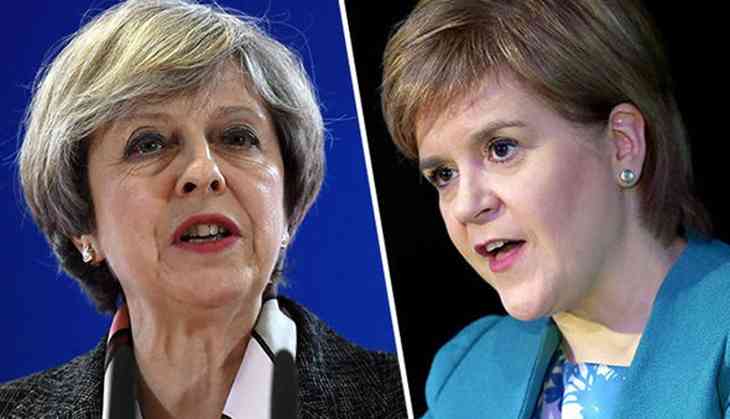Theresa May’s biggest risk with election 2017 looks to be Scotland

Theresa May’s surprise plan to hold a general election on June 8 means very different things in Scotland to the rest of the UK. While it is hard to see a bad outcome for the Conservatives in England, the prime minister is certainly taking a risk north of the border. ![]()
At UK-level, she clearly feels her position is unassailable. She is arguing that she needs as strong a mandate as possible in EU negotiations and that only a vote for the Conservatives can protect UK interests. This will be a potent argument against a weak Labour opposition riven by division over Brexit.
It may also win her some votes in Scotland, yet May’s prospects look far less certain there. It is only weeks since May responded to Nicola Sturgeon’s proposal for a second independence referendum by saying that “now is not the time” and that the Scottish first minister should get on with the day job.
The SNP leader will no doubt seek to capitalise: May’s arguments sound weaker coming from someone who followed up by triggering Article 50 and announcing plans for a UK election. Sturgeon has already called May’s election move a “huge political miscalculation” and an “extraordinary U-turn” on her previous insistence that the current UK parliament would run for the full five-year term.
The SNP has also been handed the opportunity to portray itself as the party that stands up for Scotland against a Conservative-dominated UK. With the Conservatives perhaps heading for a landslide victory, this will be a strong argument – and Sturgeon has started saying this already.
Whither indyref2?
It will be interesting to see how the party frames the independence referendum in its election manifesto. It may well explicitly seek to strengthen the mandate it received for a second independence referendum in the 2016 Scottish election by making it a manifesto commitment this time around.
On the other hand, it will be more challenging for the SNP to hold the unprecedented 56 out of 59 Scottish seats that it won at the 2015 UK election. Two of the party’s MPs, Natalie McGarry and Michelle Thomson, have had the whip withdrawn in controversial circumstances and voters may choose to punish them in these seats.
The Scottish Conservative party is also stronger. While not yet at the levels of support it had in 1992, it will be disappointed if it does not win at least a few extra seats by successfully harnessing the unionist vote in particular constituencies – at present it only has one, David Mundell in Dumfriesshire.
The SNP success in 2015 was after the 2014 referendum, when the party said it was not seeking another referendum but merely holding Westminster’s “feet to the fire”. Favouring a referendum but having not worked out details will be a more difficult sell for the party in an election.
Party time
For both the SNP and Conservatives, the issue will be one of managing expectations. Downplaying your prospects beforehand can allow a decent result to be portrayed as a great result.
This should be easier for the Conservatives in Scotland than the SNP. By arguing for a mandate for a referendum, the SNP might find it hard to both build momentum and talk down prospects at the same time.
As for Labour, the UK party would perhaps be better voting against allowing the prime minister to call an election and instead calling on her to get on with her job – thereby avoiding losing MPs. But since that already looks unlikely, Scottish Labour’s only consolation is that, unlike the UK party, it does not have far to fall in Scotland. Any success will be a relief.
Whether enough Conservatives will vote tactically to keep sole Scottish Labour MP Ian Murray in his Edinburgh seat is difficult to discern. This year may well witness the end of Scottish Labour at Westminster level. The party’s best hope may be Glasgow East if it has a particularly strong candidate and Natalie McGarry chooses to stand as an independent and splits the pro-independence vote.
The Scottish Liberal Democrats will be hoping to at least keep the party’s one seat and capitalise on Labour’s divisions over Brexit. Edinburgh West may be a possibility for a gain.
May’s gamble may well result in a massive majority at Westminster and a numerically weaker opposition. But any celebrations will be muted if the union with Scotland looks still more strained after the election.
It may not quite be a proxy for an independence referendum. But this election will certainly have an important bearing on what happens when the next referendum finally comes.
William McDougall, Lecturer in Politics, Glasgow Caledonian University
This article was originally published on The Conversation. Read the original article.
First published: 20 April 2017, 17:47 IST
